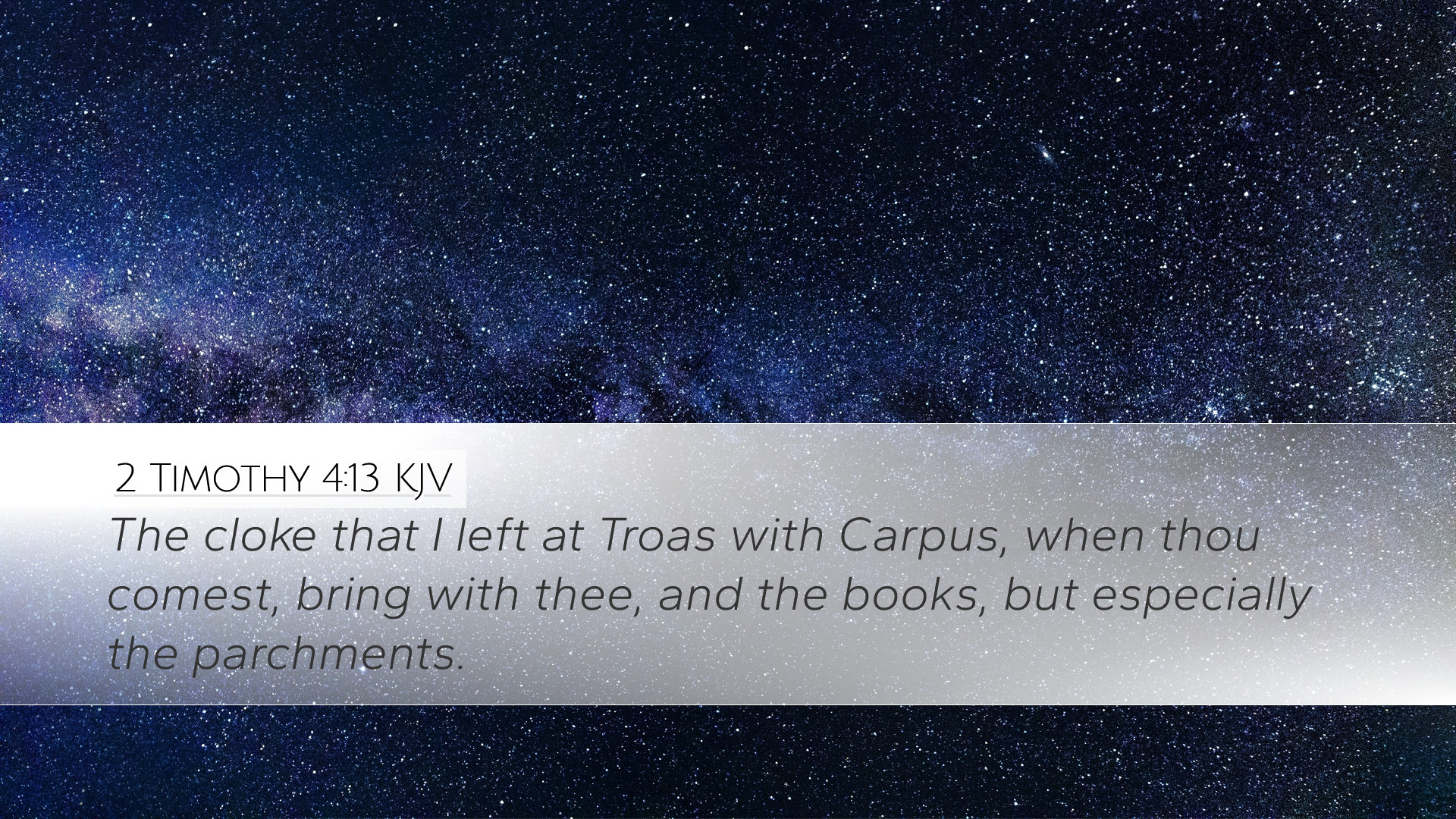Commentary on 2 Timothy 4:13
Verse Text: "The cloak that I left at Troas with Carpus, when thou comest, bring with thee, and the books, but especially the parchments."
Introduction
In this passage, the Apostle Paul shares personal requests with Timothy during his final days. The significance of this verse lies not only in the practical aspects of Paul's need for a cloak and books but also in its emotional depth and theological implications. Here, we explore insights from several public domain commentaries to enrich our understanding of this seemingly simple yet profound verse.
The Cloak
Paul’s mention of the cloak he left at Troas speaks to both his physical needs and his vulnerable condition as he awaits execution. As Matthew Henry observes, the cloak symbolizes both comfort in a cold prison as well as a reflection of Paul’s earthly detachments. He notes that Paul, the renowned apostle, in his hour of trial, demonstrates a practical reliance on his friends for basic necessities, showcasing the humanity of this great spiritual leader.
Albert Barnes adds that the cloak also represents the transient nature of Paul’s ministry. Despite his significant contributions to the early church, Paul is reminded of his physical limitations and the simple joys of life that accompany human existence. This need for a physical object highlights the reality that even those called to high spiritual endeavors are still susceptible to the necessities of this world.
The Books and Parchments
Paul’s request for books and especially parchments is noteworthy. Adam Clarke suggests that "books" likely refers to scrolls containing teachings or scriptures, while "parchments" could imply personal writings or collected thoughts that were essential for Paul's continued reflection on Scripture and theological teachings. This indicates Paul’s commitment to learning and teaching even in the face of death.
This quest for knowledge and spiritual nourishment reflects a disciplined mind at work, even in dire circumstances. As Henry points out, Paul's desire for the parchments suggests a longing for more than just companionship or physical warmth; it points towards an insatiable spiritual hunger to engage with the word of God. It serves as a vital reminder to contemporary readers of the value of persistent pursuit of learning throughout all stages of life, particularly in preparation for our spiritual journeys.
The Role of Carpus
The name "Carpus" used in this verse tells us about the community surrounding Paul. According to Barnes, Carpus represents a link between Paul and the wider community of believers. His willingness to safeguard Paul’s belongings signifies the importance of Christian fellowship and support. It encapsulates a moment where the church embodies the love and service that each believer should extend towards one another.
Personal Reflection and Application
In conclusion, John Calvin's reflections on the personal nature of this request provide a substantial emotional layer. This passage not only offers insight into Paul’s life but also speaks to the reader about the significance of companionship, the need for comfort, and the desire for spiritual stability amidst trials. Through this personal note, we are challenged to be diligent in our relationships—understanding that even great leaders like Paul valued their dependence on fellow believers.
Theological Implications
Theologically, this verse emphasizes the need for continual engagement with scripture and knowledge, portraying the Bible as a source of life and guidance, especially in challenging times. Henry notes that "the books" are not merely texts but are instrumental in sustaining faith and shaping doctrine. This demonstrates the importance of scripture in our lives, encouraging pastors, students, and scholars to remain steadfast in their theological studies.
Conclusion
2 Timothy 4:13 stands as a poignant reminder of the human experience. The combination of physical needs and spiritual desires resonates deeply with anyone who grapples with the tensions of ministry and personal life. In this solitary moment, Paul exhibits profound humility and depth, reminding us of our own reliance on God and others.
As we reflect on Paul's final requests, may we be inspired to pursue warmth—not just of the body, but of the spirit—and to cherish the vital friendships that sustain us through all trials. Let this verse challenge us to balance our earthly requirements with a persistent hunger for divine wisdom and connection within the body of Christ.


